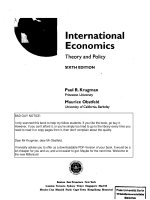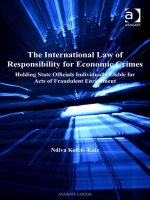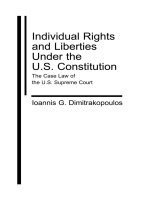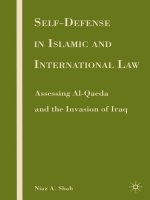International law, rights and politics docx
Bạn đang xem bản rút gọn của tài liệu. Xem và tải ngay bản đầy đủ của tài liệu tại đây (1.42 MB, 248 trang )
International law, rights and politics
Recent political upheavals in Eastern Europe have led to a
proliferation of new states on the world scene. This has, in many
instances, led to deep, international concern about rising nationalism
and these countries’ relations with one another.
Rein Müllerson’s book is concerned with the interplay of
international law and politics in the changing international system.
The author discusses, in the light of events in Eastern Europe and the
former USSR, such issues as: the non-use of force, non-interference in
internal affairs, the self-determination of peoples, the protection of
minorities, the role of nationalism in inter-ethnic conflicts, and human
rights in posttotalitarian societies. Controversial issues of continuity
and succession of states and their recognition are analysed in the
same context.
One of the main purposes of this book is to show how these
developments influence the international system as a whole and how
international law has to change in order to respond to new challenges.
Rein Müllerson is Visiting Centennial Professor at the London
School of Economics. Between 1988 and 1992 he was a member of the
UN Human Rights Committee and in 1991–2 he was Deputy Foreign
Minister of Estonia.
Books published under the joint imprint of LSE/Routledge are works
of high academic merit approved by the Publications Committee of the
London School of Economics and Political Science. These publications
are drawn from the wide range of academic studies in the social
sciences for which the LSE has an international reputation.
The New International Relations
Edited by Barry Buzan, University of Warwick, and Gerald Segal,
International Institute for Strategic Studies, London.
The field of international relations has changed dramatically in
recent years. This new series will cover the major issues that have
emerged and reflect the latest academic thinking in this particularly
dynamic area.
International law, rights
and politics
Developments in Eastern Europe
and the CIS
Rein Müllerson
London and New York
First published 1994
by Routledge
11 New Fetter Lane, London EC4P 4EE
This edition published in the Taylor & Francis e-Library, 2005.
“To purchase your own copy of this or any of Taylor & Francis or Routledge’s
collection of thousands of eBooks please go to www.eBookstore.tandf.co.uk.”
Simultaneously published in the USA and Canada
by Routledge
29 West 35th Street, New York, NY 10001
© 1994 Rein Müllerson
All rights reserved. No part of this book may be reprinted or
reproduced or utilized in any form or by any electronic,
mechanical, or other means, now known or hereafter invented,
including photocopying and recording, or in any information
storage or retrieval system, without permission in writing from
the publishers.
British Library Cataloguing in Publication Data
A catalogue record for this book is available from the
British Library.
Library of Congress Cataloging in Publication Data has been
applied for
ISBN 0-203-97686-X Master e-book ISBN
ISBN 0-415-10687-7 (Print Edition)
ISBN 0-415-11134-x (pbk)
To the memory of Professor Grigorii Tunkin
Contents
Series editors’ foreword
ix
Acknowledgements
xii
Introduction
1
1 The end of the Cold War: International law and politics
at a crossroads
6
International law in the international system
6
The role of the nation-state in the international system
10
The Cold War international system
13
Prospects for the future: threats and opportunities?
18
Russia—a problem or solution?
28
Towards a loose universal international system?
37
Challenges and opportunities for international law
42
2 Self-determination: Right to secession or entitlement to
democracy?
59
Some historical remarks
59
Self-determination, territorial integrity and human rights
62
The dissolution of the USSR and the decolonization process
65
Self-determination in democracies and in authoritarian
(totalitarian) states
68
Self-determination as a principle of inclusion, not exclusion
72
Peoples and/or minorities?
74
Minorities versus majorities
75
Territorial autonomy: a remedy against or a road
to
secession?
79
Use of force and self-determination
80
Totalitarianism, independence and democracy
83
The world community’s responses to secessionist claims
85
Self-determination and nationalism
88
Concluding remarks
91
3 Minorities in Eastern Europe and the former USSR:
Problems, trends and protection
93
Historical remarks on the problem
93
Minority issues in the USSR and Eastern Europe before
the
‘Big Bang’
96
Ethnic diversity of new states in the former USSR
99
Nationalism and ethnic minorities
101
International law and techniques for the resolution of
the
problems of minorities
107
Protection of minorities under customary international law
109
Minorities and persons belonging to minorities
111
Minorities and citizenship
112
Minorities and their ‘motherlands’
114
Minorities and consociational democracy
115
4 Law and politics in the recognition of new states 119
International law on the recognition of states
119
Recognition of the Baltic states
121
Recognition of the other republics of the former USSR
125
Recognition of the republics of the former Yugoslavia
127
Concluding remarks
137
5 Issues of continuity and succession of states 139
International law on the succession of states
139
Russia—a successor to the Soviet Union or its continuation?
141
The special case of the Baltic states
147
Succession to borders and the
Uti Possidetis
principle
150
vii
Issues of succession in the cases of the other former Soviet
Republics
152
Succession to universal treaties and human rights
obligations
156
Concluding remarks
160
6 Human rights and democracy in post-totalitarian
societies
162
From totalitarianism to
Perestroika
and
Glasnost 162
Collectivism, individualism and human rights
165
Common heritage and specific problems
174
Russia’s and its Slavonic neighbours’ struggle
for democracy
176
Some reflections on human rights in other former
Soviet
republics
184
Prospects for democracy in post-totalitarian societies
187
Conclusion
197
Notes
200
Index
226
viii
Series editors’ foreword
When we first conceived of a series on ‘The New International
Relations’, we had in mind books that would take as their starting
point the recent structural changes in international affairs. We also
had in mind books that would be interdisciplinary, especially as
concerned the chasm that so often divides theorists from empiricists.
Therefore it is with the greatest pleasure that we introduce the first
book of the series by Rein Müllerson. It is both auspicious and
appropriate that our first author was a citizen of the former Soviet
Union, for it was the collapse of his country that played such an
important part in shaping the new international relations.
The purpose of this series is to assess the nature of change in
international affairs. Some aspects of change, such as the collapse of
the Soviet Union and the end of the Cold War, seem obvious and easy
to assess. Detecting change in the underlying structure also requires
an assessment of new technologies and perceptions. There can be no
certainty about the shape of the new international relations as yet, if
only because many changes have barely taken hold and others have
faded before they had a chance to become entrenched. It even seems
like ages since we began discussing a ‘new world order’, though in
reality it has barely been three years. Early euphoria about that new
order has given way to harsher cynicism about the limits of
multilateralism and co-operation. In this era of rapid and often short-
lived change, the pressure is increased on academics to develop a more
sophisticated sense of what is new in international relations. It is still
not clear either what the deeper structural changes are, or how much
impact the ideological and power shifts of the last few years are going
to have on the rest of the international system. The judgements of
journalists got us through the first few years, but the pace of change
seems to be slowing.
As we look back at what has changed in international affairs we
are struck by the continuity in the categories of questions that can be
asked about the international system, even though the details in the
categories have changed a great deal. Thus one of the virtues of Rein
Müllerson’s analysis is the fact that his basic subject of analysis
seems familiar. Selfdetermination, minority rights, human rights in
general, as well as the debates about recognition of states and their
rights and obligations of succession, are all topics familiar to
observers of international relations well before the Cold War. If ever
we needed a reminder that what is ‘new’ is often ‘old’, just wrapped
differently, the reader might try replacing the Soviet Union with the
Ottoman Empire and see how their judgement is affected.
Rein Müllerson’s strength is based on a firm grounding in specific
politics of the Soviet Union and the way in which its empire collapsed.
This is a book about politics that uses insights from international
legal analysis. It is equally a book about domestic politics that shape
international affairs. If the reader takes away anything from this
analysis it is the need to avoid narrow categories of thought. It is simply
not possible to understand the implications of the collapse of the
Soviet Union by remaining within traditionally narrow academic
disciplines.
There are four clusters of issues that are used to illustrate the
nature of post-Soviet international affairs. Rein Müllerson begins with
aspects of self-determination because, after all, this was what brought
the Soviet Union to its knees. But his analysis makes clear that the
implications of self-determination in the modern world are far from
simple. The Baltic states may have spun out of Russia’s orbit, but
there are important minorities in the new states that feel their rights
to self-determination are now restricted. These vexed issues wrecked
Bosnia-Hercegovina and are tearing their way through the Caucasus.
Ethnicity has never been as actively debated this century, and the
debates remain inconclusive because these are more questions of
culture and politics than about law.
A related cluster of issues concerns minority and general human
rights. Some may feel that these rights should be seen as universal
and legally defined, but the reality is that politics and power are key
factors in determining how these issues are handled. There is no
obvious point at which minorities can seek self-determination as the
events around Russia’s rim and in southern Europe make plain. How
small does a unit have to become before it accepts that its rights will
have to be protected within a larger unit where it constitutes a
miniority? So far we seem to be still slipping down the slope to micro-
units, and thus it is especially useful to have Professor Müllerson take
us back to basic principles. There seems to be no escape from
considerations of ethnicity and culture, even in the realm of human
rights. The United Nations review conference in Vienna in 1993
reminded us that these debates assume even greater vehemence in a
x
post-Cold War world, in part because there is less to hold together the
states of what was once referred to as the West.
The third cluster of issues discussed by Müllerson is that
surrounding the recognition of new states. The essentially political
nature of this process is obvious. States can be seen as increasingly
artificial, as is evident in many of the former republics of the Soviet
Union. The depth of the absurd was reached with the notorious Vance-
Owen plan for Bosnia which envisaged a jigsaw-puzzle of a state. The
Caucasus seems headed down a similar road where reality is best
described as warlordism not deserving of international recognition.
And yet we were all warned not to be hustled into recognizing Bosnia
because the state was bound to collapse and for West European
political reasons our governments ignored good advice. This is
unlikely to be the last time we make that mistake.
The fourth cluster concerns the rights and obligations of new states
as successors to old ones. Consider how Ukraine stands up to Russian
pressure about defining their rights of succession to the Soviet Union,
while many other members of the CIS clamber back into Russia’s fold
on Russia’s terms. As Rein Müllerson makes plain, these matters are
resolved in a realist fashion, with legal conventions barely providing
categories of thought.
Professor Müllerson writes with the confidence of an international
lawyer who recognizes that law can and will be manipulated where
there is the political will to do so. Therefore he writes with the
aspirations and ideals of an international lawyer, and the
hardheadedness of a realist observer of politics. The result is analysis
that manages to stay ahead of the changing reality and yet holds out
hope for eventual control and manipulation of political instincts. Rein
Müllerson challenges us to meet the new realities, and helps provide
us with the tools to do so.
Barry Buzan and Gerald Segal
1994
xi
Acknowledgements
The writing of this book would have been impossible were it not for
the invitation by the London School of Economics and Political Science
asking me to be Visiting Centennial Professor for two years. This is
not only an immense honour for any scholar but, in addition, the work
in this most renowned School, which next year will celebrate its
centenary, is extremely stimulating and simply pushed me towards
this interdisciplinary research. Some of the chapters of the book are
based on my lectures given at the LSE.
I am most grateful to my colleagues at the LSE who read the
manuscript, or parts of it, and made valuable comments and
suggestions: Daniel Bethlehem, Professor Leonard Leigh, Dr Margot
Light and Professor James Mayall. Lectures given two years ago at
the New York University on the legal problems of the dissolution of
the USSR at the invitation of Professor Thomas Franck, and our
resultant discussions, added great impetus to the research. I am also
very grateful to Professor Asbjorn Eide with whom many issues raised
in the book were discussed.
My special thanks go to Professor Rosalyn Higgins. Her help and
guidance have always been invaluable. I am thankful to Cairo Robb
who helped me to put the whole manuscript in order and to trace
missing footnotes and quotations. My family—Irina, Jan and George—
supported me in every possible way.
Finally, I thank the
International and Comparative Law Quarterly
and the
Modern Law Review
for their permission to use material from
my two articles published in these journals.
Introduction
International law and politics are once more at a crossroads because
at the end of the century the world is undergoing revolutionary
changes. The sudden end of the Cold War overlaps with such
fundamental but more incremental developments as the aggravation
of the global problems and the emergence of new actors in the
international system. These changes often point in different
directions. So the latest dramatic events in the world have created not
only serious dangers for individual countries as well as for the world
community as a whole but also unique opportunities to face challenges
for mankind.
There are probably more reasons than ever to assert that the
current international system is today undergoing radical changes
comparable with such historic milestones as, for example, 1648 and the
emergence of the Westphalian international system, or 1789 and the
French Revolution and the subsequent Napoleonic wars, or 1917 and
the Socialist Revolution in Russia, or 1945 with the end of World War
II, the creation of the UN and beginning of the Cold War. The
liberation of colonies and the emergence of the Third World was, of
course, a process of comparable significance but more extended in
time.
It is not yet clear what date will become a short abbreviation for
future historians to mark this radical transformation: 1985 with the
start of the
perestroika
and
glasnost
era in the former USSR, which
triggered off all following events; 1989 with its ‘velvet revolutions’ in
Eastern Europe; or 1991 and the dissolution of the Soviet Union. It is
likely that 1989 has the best chance because it comes exactly 200
years after 1789 and had its own Bastille—the Berlin Wall which
came down in autumn 1989.
There are many angles from which to look at these revolutionary
changes in the world. One of the most important of them is the
perspective of the new international system and the role of
international law and the institutions in it. How do these changes affect
the structure of and the correlation of forces in the international
system? What challenges do international institutions and norms
face? Are these changes conducive to the effectiveness of international
law and organizations? How did international law and its institutions
respond to these drastic developments, and what changes—if any—
are necessary for international law to correspond to new realities?
These are very broad questions and I will limit my research to those
aspects of them which are closely related to or stem from the
dissolution of the USSR and events in Eastern Europe (i.e. which
directly result from the end of the Cold War).
Due primarily to the collapse of the USSR such problems as the self-
determination of peoples and the protection of ethnic minorities,
which both are closely linked to the question of the ascendence of
nationalism in different countries of the world, have become once
more crucial issues of world politics. The concentric circles engendered
by the end of the Soviet empire are spreading far from the former
USSR. The end of the Cold War has put forward, as well, the question
of the prospects of democracy and human rights in post-totalitarian
societies, which certainly is not an internal matter of these states. Not
only are issues of democracy and human rights in individual countries
legitimate concern for the world community as a whole but it is on the
progress of domestic developments in former communist countries
that the future of the international system will depend to a great
extent. Therefore these important legal and political issues receive
special attention in the book.
The dissolution of old states and emergence of new ones have
always raised issues of recognition and succession, therefore political
and legal implications of these problems are also analysed in
respective chapters.
The book as a whole is concerned with the interplay of law and
politics in the international system after the Cold War.
It has always been necessary to study international law in the
context of an international system where the law is functioning and
developing, and to analyse legal and political problems as inseparably
intertwined (as in reality they are). But it is especially important to
put international law into the proper context at times of revolutionary
change in the international system. This means that inter-disciplinary
research and a combination of different approaches to most issues,
including international law, become absolutely necessary. As Rosalyn
Higgins writes, ‘there is no avoiding the essential relationship
between law and policy’.
1
It is therefore desirable that
the policy factors are dealt with systematically and openly.
Dealing with them systematically means that all factors are
properly con sidered and weighed, instead of the decision-maker
2 INTERNATIONAL LAW, RIGHTS AND POLITICS
unconsciously narrowing or selecting what he will take into
account in order to reach a decision that he has instinctively
predetermined as desirable.
2
Therefore such important concrete issues as the self-determination of
peoples and the protection of minorities (referred to above), where law
and politics closely interact, can be properly analysed only if this
analysis is put into an adequate wider context. This has necessitated
the analysis of such general issues as the future of the international
system, prospects of order and the role of international law and the
institutions in it. This analysis forms the content of the chapter 1.
But before embarking on the analysis of these substantive issues, a
few reflections of a methodological character—so far as they are
relevant to the forthcoming analysis—seem to be necessary.
There is a phenomenon which is rather widespread, at least in
writings on international law and politics. It is that some authors,
including the most imaginative ones, often stick firmly to the
favourite approach to their discipline and consider it to be if not the
only possible one, then at least the only true one. Realists,
behaviourists, structuralists and institutionalists in international
relations theory have certainly all grasped many important aspects of
the complex reality with which they are dealing. Similarly, legal
positivism, the natural law approach, and especially policy-oriented
jurisprudence have all contributed to the understanding and
development of international law. But, on the other hand, they all put
certain self-imposed limitations on themselves, thereby often making
their analysis one-sided (of course, there are specialists on
international law and relations who do not limit their research to one
of the possible approaches to their discipline). The question of whether
it is necessary to stick firmly to one of these or other approaches to the
discipline in order to achieve positive results needs to be answered.
Perhaps it is important, for example, that an academic
international lawyer, in order to penetrate deeply into the most
difficult issues of international law, sees not only his or her discipline
as the most important one but also his or her favourite approach as
the only true one. Perhaps only by believing (usually erroneously) that
his or her discipline is the most important one in the world, and that
his or her approach is the only true one (usually also erroneously),
does he or she find the necessary stimulus to embark on time-
consuming research. Perhaps a social scientist, in order to achieve
something noticeable, has to be an enthusiast—not only for his or her
discipline but also for his or her approach. Quite possibly. But an
enthusiastic structuralist, realist or normativist inevitably sees the
reality in a one-sided way, at least, if not in a distorting mirror. The
INTRODUCTION 3
social reality is practically always too complicated to be approached by
one particular method of analysis. But probably without such one-
sided views (which are in many cases very deep indeed because only
enthusiasts can go deep enough into a particular issue) it would be
difficult to have a proper comprehensive analysis of the problem.
I am sceptical about the ability of any of these, or of any other
approaches for that matter, individually to grasp the complexities of
the most important issues of international law and politics. Moreover,
although I am an international lawyer, I do not think that world peace
can be achieved only through world law. Events in the former
Yugoslavia, in Georgia, and in Somalia—as well as in some other
parts of the world—witness that law without force, and the
determination to use it in order to stop the most flagrant violations of
international law and morality, is powerless. Legal positivism,
certainly, is not a proper guide during revolutionary change, be it in a
single country or in the international system.
But nor can I agree with those realists who see international law as
a legal strait-jacket for international relations.
3
Moreover, sometimes
an effective strait-jacket may be needed for some of these relations. I
do not believe, either, that such broad values as respect, power,
enlightenment, well-being, wealth, skill, affection, and rectitude,
which are espoused by proponents of the policy-oriented approach to
international law
4
(the content of which, moreover, is understood
quite differently by different actors of the international system), can
always serve as a proper or better guide than concrete rules, the
observance of which may indeed sometimes make the realization of
these values difficult or even impossible. As Richard Falk observes,
these ‘values are not currently specified in relation to any of the
outstanding problems of mankind such as poverty, population
pressure, violence, and ecological decay.’
5
This does not, of course, mean that the creation, interpretation, and
application of international law can be separated from international
(or even domestic) politics, or that these or other societal values do not
affect the decision-making in the international system. International
law, though discernible in the fabric of international politics, cannot
be extracted from it without damaging the fabric.
Certainly, the subject itself dictates analytical approaches. As John
Lewis Gaddis writes,
good scientists, like good novelists and good historians, make use
of all the tools at their disposal in trying to anticipate the future.
That includes not just theory, observation, and rigorous
calculation, but also narrative, analogy, paradox, irony,
intuition, imagination, and—not least in importance—style.
6
4 INTERNATIONAL LAW, RIGHTS AND POLITICS
And even at the risk of being accused of eclecticism, I think that a
methodological (e.g. either the normativist or policy-oriented approach)
or disciplinary (e.g. either law or international relations theory)
rigidity is a self-constraint which puts limits on the
comprehensiveness of research.
This means that in the analysis of the different issues of
contemporary international life presented in the forthcoming chapters,
a purposeful effort to take into account both their legal and political
aspects, and the use of a variety of approaches, is made.
INTRODUCTION 5
1
The end of the Cold War
International law and politics at a crossroads
INTERNATIONAL LAW IN THE INTERNATIONAL
SYSTEM
Every legal system is a part of a wider social system, where it performs
its regulatory functions and which eventually determines the main
characteristics of law, its role and its effectiveness. Though such wider
systems determine the basic features of all legal systems, the latter do
not passively reflect the nature of the former but play an important
role therein. Without taking this into account it would be impossible
to have a proper understanding of the functioning of law and of the
very society of which the legal system constitutes a regulatory sub-
system. Law, Henkin sums up,
is a major force in international relations and a major
determinant in national politics. Its influence is diluted, however,
and sometimes outweighed, by other forces in a ‘developing’
international society. Failure to appreciate the strengths and
weaknesses of the law underlies much misunderstanding about
it and many of the controversies about its significance. ‘Realists’
who do not recognize the uses and force of law are not realistic.
‘Idealists’ who do not recognize the law’s limitations are largely
irrelevant to the world that is.
1
Like all domestic legal systems which are rooted in different societies
organized as states, international law also has its specific social
environment where it performs its functions. It is a legal sub-system of
the international system which, in essence, is considered by many as
an inter-state system. Thus, Louis Henkin writes that ‘international
law is the normative expression of the international polity which has
states as its basic constituent entities’.
2
Grigorii Tunkin even writes
that international law functions in the inter-state system.
3
But some specialists in international law, and others in
international relations, are questioning such a state-centric view on
their disciplines.
4
I think that there are good reasons for this. From the
point of view of an international lawyer, though states remain the
most influential actors of the international arena and are the main
subjects of international law, it is impossible to limit the social
environment of the latter to the inter-state system because the
functioning of international law quite obviously transcends inter-state
relations (even in its largest sense, i.e. including relations where inter-
governmental organizations and state-like entities participate).
Different transnational relations,
5
the role of which is increasing in the
contemporary world, are not outside the influence of international law.
Issues concerning the protection of environment or the activities of
transnational corporations, for example, if not always directly
governed by international law, are nevertheless often affected by it.
This means that today, even from the point of view of an
international lawyer (traditionally international law was considered
to be inter-state law), it would be too narrow a comparison to equate
the current social environment of contemporary international law
with the inter-state system, though, of course, inter-state relations
still constitute the core of the relations governed by international law.
Therefore, a theoretical framework for studies of both international
law and politics has to take account of ‘increasing evidence of the
importance and impact of so many factors excluded from the reigning
model: individuals, corporations, nongovernmental organizations of
every stripe, political and economic ideology, ideas, interests,
identities and interdependence’.
6
Consequently, international law has to be studied as a sub-system of
the international system which encompasses all actors and relations
and transcends state boundaries.
Moreover, international law often deeply penetrates into domestic
relations. Robert Keohane rightly observes that in order to deal with
issues concerning the compliance of states with their international
commitments, ‘[w]e must look at the interaction between
international politics and law and domestic politics,’
7
which he calls
‘institutional enmeshment’. An international lawyer would have said
that for its effective implementation international law should be
steadily anchored in the domestic law and institutions.
Civil wars, and the plight of ethnic minorities and human rights in
general, have become the object of legitimate concern for the
international community. Such concerns as human rights or
environmental protection have become what are sometimes called
intermestic issues, which means that they are neither exclusively
domestic nor international. This all means that international law’s
INTERNATIONAL LAW, RIGHTS AND POLITICS 7
social environment has become much wider than inter-state
relations.
It is not enough to study international law in the context of
international politics simply because the international system itself
emerges as a result of interaction between different domestic systems.
As the international system is, in comparison with domestic systems,
a loose system where actors are relatively autonomous
vis-à-vis
each
other, its main actors—states and their internal characteristics—
exercise crucial influence upon the nature of the international system.
This means that impulses coming to the system from actors are
decisive for the characteristics of the system.
Of course, the international system in its turn affects not only the
foreign, but often even the internal politics, of all states.
States themselves should not, either for international relations
theory or even for international law doctrines, be black boxes or
snooker balls of different size. On the one hand, the internal
characteristics of states determine the main features of the
international system. On the other hand, international factors,
including international law, penetrate deeply into domestic processes.
The influence of the internal characteristics of states on the
international system is most strongly felt at times of drastic,
revolutionary changes in the main actors of the latter. For example,
the Cold War, being essentially an inter-state phenomenon, ended, as
we will see below, thanks to revolutionary developments in the USSR
and its communist satellites, though it is hardly possible to deny that
external factors also played an important role in the collapse of the
communist system and the Soviet Union.
It is difficult, therefore, to agree with Kenneth Waltz when he
writes: ‘We do not ask whether states are revolutionary or legitimate,
authoritarian or democratic, ideological or pragmatic. We abstract
from every attribute of states except their capabilities.’
8
And
capability is defined by Waltz as power: ‘States are differently placed
by their power.’
9
Later Waltz wrote that ‘we know that part of what
happens internationally is shaped by the structure of international
politics and part by the character of the acting units.’
10
Nevertheless, it remains unclear how it is possible to have a
comprehensive (or even not so comprehensive) theory of international
relations which does not take into account all factors which shape
‘what happens internationally’. The onesidedness of any theory which
abstracts itself from the internal developments which occur in major
actors of the international system becomes especially clear in times of
revolutionary changes in the world (the word ‘world’ is used because
such changes inevitably encompass domestic as well as international
spheres).
8 THE END OF THE COLD WAR
Therefore there simply cannot be a viable international relations
theory which completely abstracts itself from the internal
characteristics of states. Of course, an author in his or her concrete
study can concentrate only on the structure of the international
system, but even in that case he or she has constantly to bear in mind
that such a theory is only a partial theory of international relations
and that even here there should not be complete abstraction from
other issues and problems which includes the internal characteristics
of states. The author in such a case simply uses results of the analyses
of other researchers.
Burry Buzan writes of structural realism that it
is only one theory among many, and we make no claim that it is
the only valid way of conceptualizing the international system. It
is simply one way that strikes us as being useful, not least
because it can be made complementary to other perspectives,
serving as a firm foundation on which to integrate many other
elements of international relations theory.
11
It is difficult not to agree with such an approach. However, any
approach has its limitations and therefore should be used whilst
taking into account other approaches and methods.
As international systems are not composed of abstract, similar or
fungible entities which interact and thereby create bipolar, multipolar
or other international systems endowed with certain characteristics, it
is necessary for understanding crucial changes in this system to have
a deep perception of domestic developments in at least the key actors
of the system. Francis Fukuyama is right in criticizing extreme
realists because
in its purest form, realism tries to banish all considerations of
internal politics, and to deduce the possibility of war from the
structure of the state system alone…But this pure form of
realism covertly introduces certain highly reductionist
assumptions about the nature of the human societies that make
up the system, mistakenly attributing them to the ‘system’
rather than to the units that make up the system.
12
Like international relations studies, research in international law
cannot abstract itself from the internal characteristics of states. The
principal of sovereign equality of states no longer means that
democratic and totalitarian states, peaceful countries and aggressors
are to be treated equally. Moreover, the very role of the nation-state in
INTERNATIONAL LAW, RIGHTS AND POLITICS 9
the international system which until recently was beyond question,
needs to be reviewed.
THE ROLE OF THE NATION-STATE IN THE
INTERNATIONAL SYSTEM
One of the controversial issues of the changing international system is
the question of the place and the role of nation states within it. The
emergence of powerful transnational corporations, the activities of
many non-governmental organizations (NGOs), the increasing role of
the individual (who in some cases may challenge his or her own state
before international bodies), and especially the development of
international organizations with supranational characteristics (e.g.
the EU), may lead one to the conclusion that the nation-state’s role in
the international arena is diminishing. Kenichi Ohmae even writes
that ‘the nation state has become an unnatural, even dysfunctional,
unit for organizing human activity and managing economic endeavour
in a borderless world’.
13
The emergence of other actors in the international system means
that the observer has to take these changes into account and may
conclude that in certain domains (e.g. economic relations) other actors
may often function more effectively than states. But the state is still,
and in the foreseeable future will remain (notwithstanding the
relative decline of its strength), the main and the most powerful actor.
Paul Kennedy writes that the major argument of his book ‘is that the
nature of the new challenges makes it more difficult than previously
for governments to control events. But they still provide the chief
institution through which societies will try to respond to change.’
14
This is certainly true. Even the considerable increase in the
importance of multilateral diplomacy and, consequently, of
international organizations, does not mean that they are going to
replace the states as the major actors of the international system.
Even in the EU, Brussels has not succeeded, and at least in the near
future will not succeed, in replacing national authorities, though the
European institutions perform many functions which traditionally
belonged to the governments. International inter-governmental
institutions have become an important tool, which not only increases
states’ capabilities but at the same time limits their behaviour.
Nevertheless they are only instruments, though very important ones,
of states and are not in themselves super-states.
In most important areas of global concern, such as environmental
protection, issues of peace and war and even in the field of human
rights protection, one may say that there is, thanks to modern means
of communication, an emerging global ‘constituency’ represented
10 THE END OF THE COLD WAR
mainly by different NGOs, which if not always directly participating
in the decision-making process are at least exercising considerable
influence on it. Often, though, it is only states which have sufficient
means and powers to make decisions and to carry them out. States are
far from perfect institutions for dealing with such global issues
because their ‘constituencies’, and consequently their interests, are too
narrow for the resolution of global problems and concerns. But,
notwithstanding the important role of all green movements and
national as well as international NGOs on human rights, it was
necessary to have intergovernmental decision-making world
conferences on environmental protection in Rio in 1992 and on human
rights in Vienna a year later. Therefore those writers on international
law and relations, like adherents of critical legal studies
15
who leave
the state out of their reckoning, sound rather detached from reality.
At the same time, of course, the relative influence of other actors
(e.g., international organizations, NGOs, multinational corporations,
or sub-structures of states) in international decision-making will
increase. But, even more than from the rise of other competitors to the
state in the international arena, the relative strength of states is
being eroded by two tendencies which are often interrelated. Economic
integration is a main propeller of the diminishing role of national
frontiers. On the other hand, the fact that the processes of integration
are accompanied by alienation and impersonalization of life in many
societies, gives rise,
inter alia,
to nationalism and other forms of
parochialism. Graham Fuller rightly observes that:
In the end, even nationalism will prove insufficient to satisfy
cravings for a more precise, more manageable sense of identity.
It is not enough to be one of many tens of millions of Nigerians,
Bengalis, or Indonesians. People revert to smaller communal
groupings, the tribe or the region, the dialect or the local
language.
16
Separatism and secessionist claims may be confronted by increased
centralization and repression (as was done, for example, in Sri Lanka
in face of Tamil separatism, in China against Tibet’s struggle for
independence, in Georgia under Ghamsahurdia against South Ossetia
and Abkhazia) and one may claim that such a policy results in the
strengthening of state power. But secessionist claims may be
confronted by more complicated and subtle arrangements such as
autonomy and the diminishing importance of state boundaries. The
movement for ‘a Europe of regions’ instead of a Europe of states may
be far from achieving its aims, but, in Western Europe and North
America, borders between states as well as the line between
INTERNATIONAL LAW, RIGHTS AND POLITICS 11
dependence and independence have sometimes become rather
blurred. The development of the EU and now probably the NAFTA
may lead to a situation where objectively (not, yet, subjectively) it
would be less important, for example, for Quebec to belong to Canada
or not; or for Catalonia to be officially considered a part of Spain or to
belong directly to the EU, or whether it should be called, as one of the
advertisements before the Olympic games in Barcelona put it, ‘a
country in Spain with its own culture, language and identity’.
17
Unfortunately, the second experience has been until now confined to
Western Europe and North America. In other parts of the world
separatism more often than not increases internal oppression and
centralization of state powers, or leads to bloody wars of secession.
Why it is so, and the essential relationship between democracy and
the resolution of inter-ethnic problems, will be analysed in following
chapters.
Such changes have considerably modified the international system.
States are no longer the only actors of the system. Martin Shaw is
right when he says that:
We should stop seeing non-state actors as intruders into the
system and society of states, and see them instead as actors
within global society of which the state system is an institutional
component, and whose intrusion is therefore entirely normal and
inevitable.
18
We may conclude by saying that though states remain the most
influential actors of the international system, their relative role is
diminishing for reasons other than simply the entrance of new actors
into the system. The main reason is that states are often not the best
resolvers of new issues, many of which are either too big or too small
for the state. The emergence of global problems, and the
democratization which is taking place in many societies as well as in
the international arena, means that the importance of the two
extreme participants of social relations—mankind as a whole and the
individual—is increasing. Moreover, the interests of states and those
of the societies which they represent or claim to represent do not
always coincide. Societies themselves become more and more actively
involved in world politics, often circumventing states as their
representatives.
19
Michael Walzer predicts that the interest of political
theorists over the next decades will lie above and below the level of
the nation (and the nation-state). ‘It will lie in the transnational
formations of different sorts and in civil society.’
20
There are good
reasons for such an assertion.
12 THE END OF THE COLD WAR









